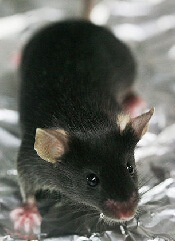User login

Preclinical research suggests a novel antibody can inhibit the migration of lymphoma cells and stop the cells from proliferating.
“Since they cannot survive in the blood for long, [lymphoma] cells are compelled to find a more accommodating environment—such as the lymphatic system—where they can proliferate,” explained Thomas Matthes, MD, of the University of Geneva in Switzerland.
“We decided to focus on this Achilles’ heel by containing them in the blood so as to prevent any resulting harm.”
Dr Matthes and his colleagues described this approach in the Journal of Leukocyte Biology.
The team noted that the inner wall of blood vessels is formed by a layer of endothelial cells that act as a barrier, which prevents the blood cells from leaving the circulation.
Yet, some lymphoma cells are equipped with a surface marker, the JAM-C protein, that is also present on the surface of endothelial cells. JAM-C’s presence on the surface of lymphoma cells facilitates their migration through the vessel walls between adjacent endothelial cells.
To block the effect of this protein, Dr Matthes and his colleagues developed an antibody targeting JAM-C.
This antibody, H225, was designed to bind solely to JAM-C. In doing so, H225 was able to prevent lymphoma cells from migrating out of the blood vessels.
In fact, H225 decreased the transit of lymphoma cells into the organs of the lymphatic system by over 50%.
“This is not its only effect,” Dr Matthes noted. “H225 also significantly limited cell proliferation, even when tumor cells had already settled in the lymphatic system. In our mice, we observed the nearly complete disappearance of already present tumor cells in the organs.”
Specifically, H225 reduced tumor growth of JAM-C+ mantle cell lymphoma cells in the bone marrow, spleen, liver, and lymph nodes.
The researchers believe this work has laid the foundation for a new therapeutic strategy against lymphoma. The team is now focusing its efforts on the quest for an efficient treatment that could be offered to patients. ![]()

Preclinical research suggests a novel antibody can inhibit the migration of lymphoma cells and stop the cells from proliferating.
“Since they cannot survive in the blood for long, [lymphoma] cells are compelled to find a more accommodating environment—such as the lymphatic system—where they can proliferate,” explained Thomas Matthes, MD, of the University of Geneva in Switzerland.
“We decided to focus on this Achilles’ heel by containing them in the blood so as to prevent any resulting harm.”
Dr Matthes and his colleagues described this approach in the Journal of Leukocyte Biology.
The team noted that the inner wall of blood vessels is formed by a layer of endothelial cells that act as a barrier, which prevents the blood cells from leaving the circulation.
Yet, some lymphoma cells are equipped with a surface marker, the JAM-C protein, that is also present on the surface of endothelial cells. JAM-C’s presence on the surface of lymphoma cells facilitates their migration through the vessel walls between adjacent endothelial cells.
To block the effect of this protein, Dr Matthes and his colleagues developed an antibody targeting JAM-C.
This antibody, H225, was designed to bind solely to JAM-C. In doing so, H225 was able to prevent lymphoma cells from migrating out of the blood vessels.
In fact, H225 decreased the transit of lymphoma cells into the organs of the lymphatic system by over 50%.
“This is not its only effect,” Dr Matthes noted. “H225 also significantly limited cell proliferation, even when tumor cells had already settled in the lymphatic system. In our mice, we observed the nearly complete disappearance of already present tumor cells in the organs.”
Specifically, H225 reduced tumor growth of JAM-C+ mantle cell lymphoma cells in the bone marrow, spleen, liver, and lymph nodes.
The researchers believe this work has laid the foundation for a new therapeutic strategy against lymphoma. The team is now focusing its efforts on the quest for an efficient treatment that could be offered to patients. ![]()

Preclinical research suggests a novel antibody can inhibit the migration of lymphoma cells and stop the cells from proliferating.
“Since they cannot survive in the blood for long, [lymphoma] cells are compelled to find a more accommodating environment—such as the lymphatic system—where they can proliferate,” explained Thomas Matthes, MD, of the University of Geneva in Switzerland.
“We decided to focus on this Achilles’ heel by containing them in the blood so as to prevent any resulting harm.”
Dr Matthes and his colleagues described this approach in the Journal of Leukocyte Biology.
The team noted that the inner wall of blood vessels is formed by a layer of endothelial cells that act as a barrier, which prevents the blood cells from leaving the circulation.
Yet, some lymphoma cells are equipped with a surface marker, the JAM-C protein, that is also present on the surface of endothelial cells. JAM-C’s presence on the surface of lymphoma cells facilitates their migration through the vessel walls between adjacent endothelial cells.
To block the effect of this protein, Dr Matthes and his colleagues developed an antibody targeting JAM-C.
This antibody, H225, was designed to bind solely to JAM-C. In doing so, H225 was able to prevent lymphoma cells from migrating out of the blood vessels.
In fact, H225 decreased the transit of lymphoma cells into the organs of the lymphatic system by over 50%.
“This is not its only effect,” Dr Matthes noted. “H225 also significantly limited cell proliferation, even when tumor cells had already settled in the lymphatic system. In our mice, we observed the nearly complete disappearance of already present tumor cells in the organs.”
Specifically, H225 reduced tumor growth of JAM-C+ mantle cell lymphoma cells in the bone marrow, spleen, liver, and lymph nodes.
The researchers believe this work has laid the foundation for a new therapeutic strategy against lymphoma. The team is now focusing its efforts on the quest for an efficient treatment that could be offered to patients. ![]()